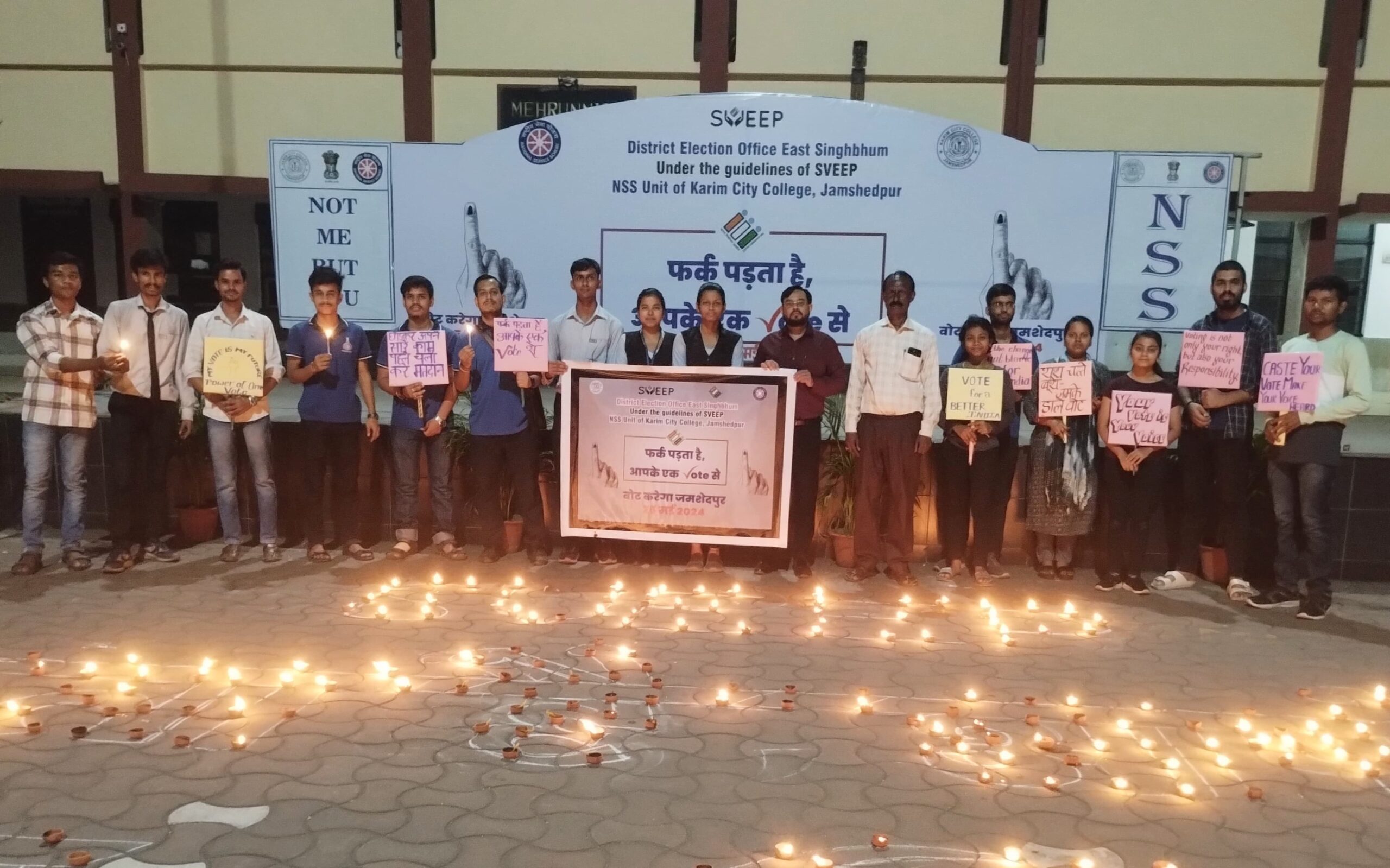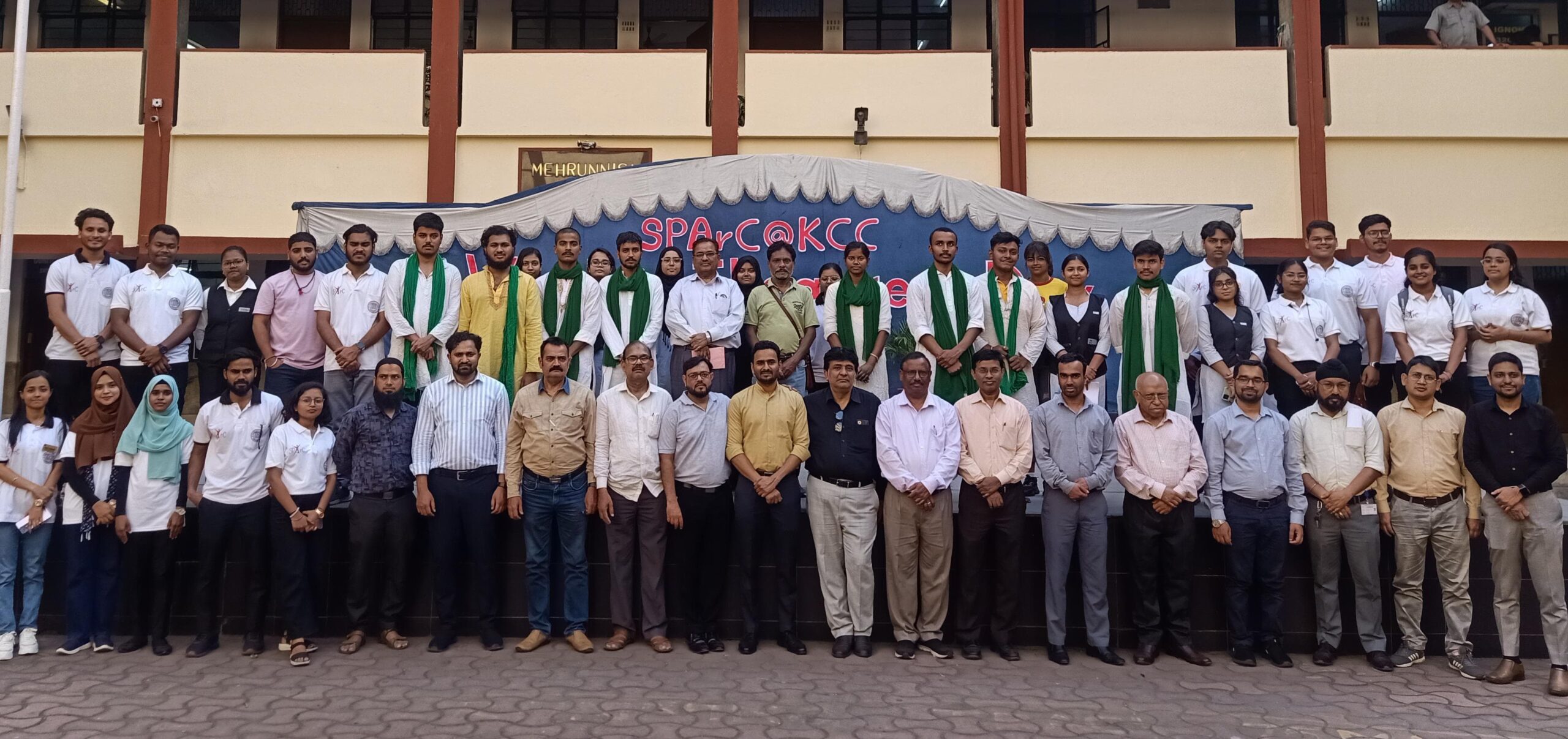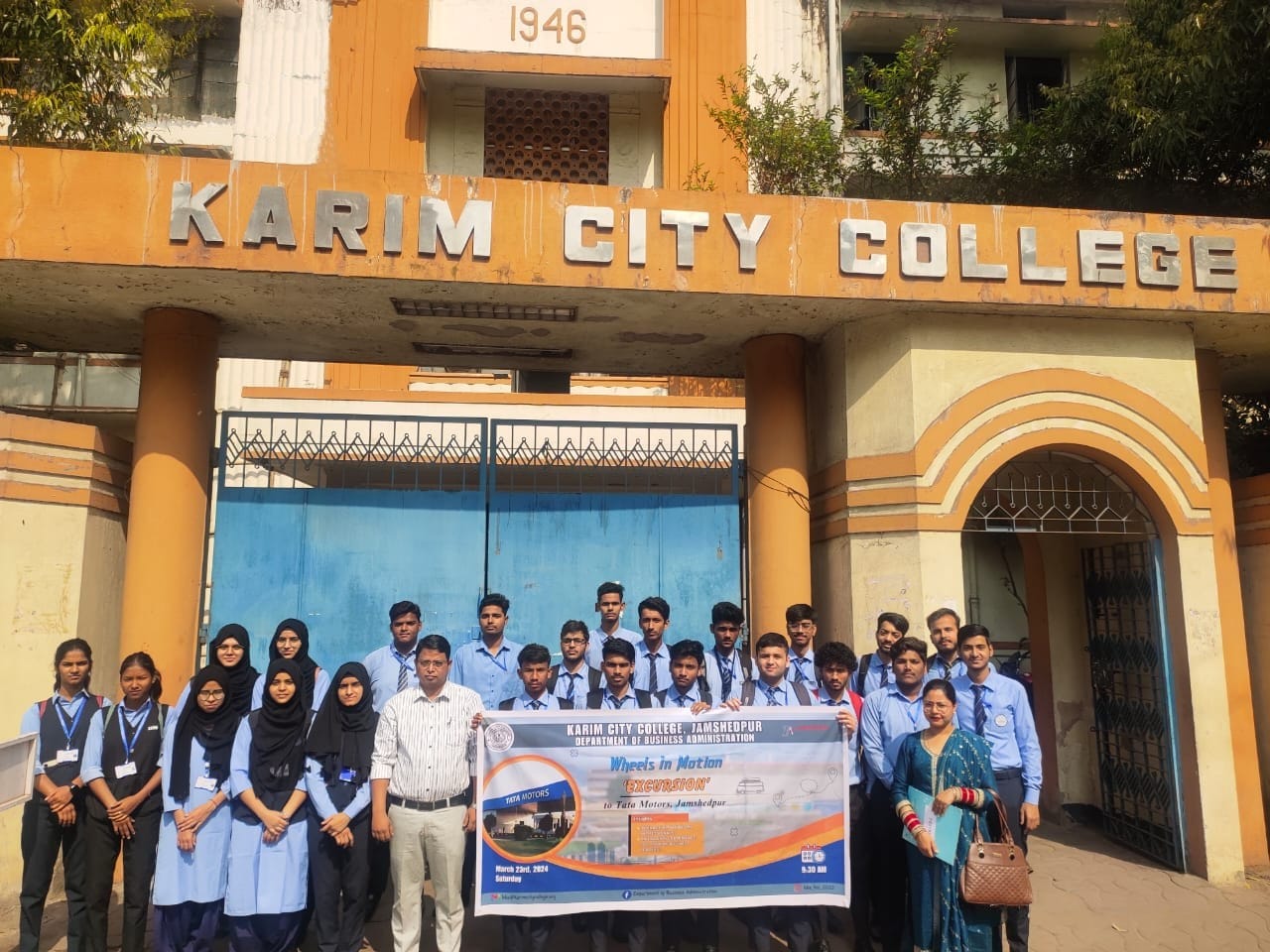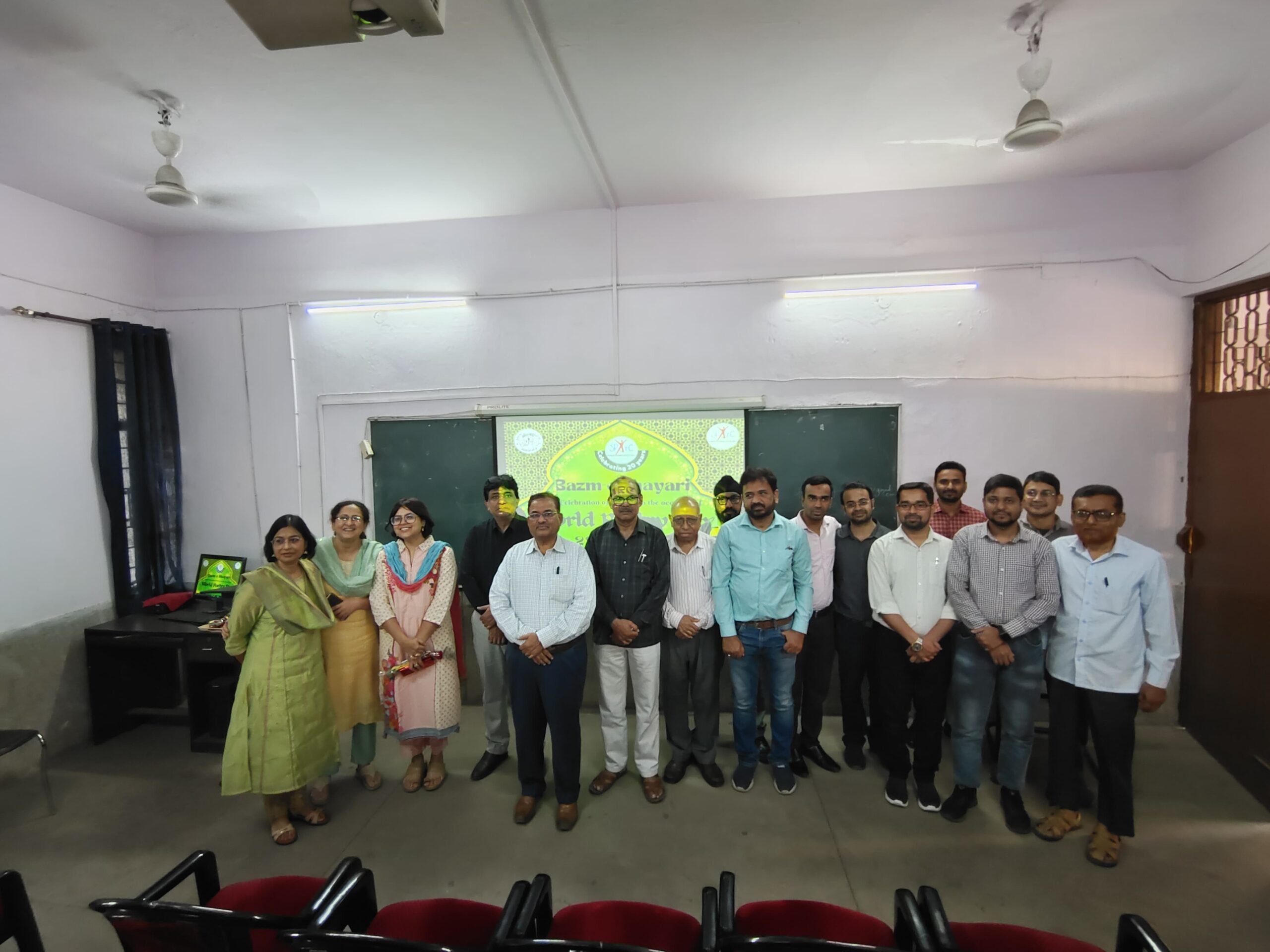Qualification: M.A., Ph.D. Designation: Assistant Professor and Head...
Department of Psychology
ABOUT THE DEPARTMENT
The Psychology Department of Karim City College, Jamshedpur, is a stronghold of intellectual exploration and academic excellence. Housed within a vibrant and progressive institution, the department stands as a beacon of inspiration for aspiring psychologists. Led by a team of distinguished and accomplished faculty members, the department offers a comprehensive and rigorous curriculum that seamlessly blends theoretical knowledge with practical experiences. Students are exposed to a plethora of cutting-edge research methodologies and psychological theories, enabling them to develop a profound understanding of human behavior and mental processes. The department’s commitment to fostering a rich learning environment is evident through its state-of-the-art facilities and resources, which facilitate hands-on exploration and critical analysis. Moreover, the department actively encourages students to engage in research initiatives, empowering them to contribute to the ever-evolving field of psychology. As a result, graduates and Post graduates from the Psychology Department, Karim City College emerge as competent and compassionate professionals, equipped with the skills and expertise to positively impact the lives of individuals and communities alike.
HISTORY
The Department of Psychology, Karim City College was established on May 1, 1965. It began its journey with a vision to provide quality education in psychology and contribute to the understanding of human behavior and mental processes.
The department’s first faculty member was Prof. S.N.I. Hashmi, who joined the department on July 1, 1966. Prof. Hashmi not only played a crucial role in shaping the department but also served as the Principal of the college. His dedication and expertise greatly influenced the growth and development of the department. Prof. Hashmi served the college until his retirement on October 10, 2003.
Dr. S.K. Ahsan was the second senior faculty member to join the department on December 21, 1968. His vast knowledge and experience in the field of psychology contributed significantly to the department’s academic excellence. Dr. S.K. Ahsan served the department with dedication and expertise until January 15, 2005.
At present, Dr. MD Firoz Ibrahimi serving as Head of the department. He joined the department on December 21, 1993, and has been serving the department ever since. Dr. Ibrahimi’s leadership has further strengthened the department’s commitment to quality education and research in psychology. He is also serving as Sports In charge of the college since 1995. Under his leadership and guidance college won many championships in different sports events. He also served as NSS coordinator of the college and as well as coordinator of the sports in Kohan University. He also served as controller of exam.
Dr. Zaki Akhtar is another esteemed faculty member of the department, serving as an Assistant Professor. He joined the department on January 2, 2002, and continues to contribute his expertise and knowledge to the development of students. He is also Professor In charge of Post Graduate Diploma in Guidance and Counselling.
Dr. Udham Singh is the third faculty member of the department, joining as a permanent faculty member on March 4, 2022. With his fresh perspectives and passion for psychology, Dr. Singh is expected to contribute to the department’s growth and academic excellence.
Dr. Satyavrata Panda is the fourth faculty member, initially joining the department as an ADHOC Teacher. His dedication and commitment to teaching have made him an invaluable asset to the department.
Over the years, the Department of Psychology, Karim City College has evolved into a renowned institution known for its academic excellence and commitment to producing skilled professionals in the field of psychology. The department continues to thrive under the leadership of its dedicated faculty members, who have played a pivotal role in shaping its history and contributing to its success.
VISION
The vision of the department to be a leading center of excellence in psychological education and research, fostering the development of compassionate and skilled professionals who contribute to the betterment of society. As the Department of Psychology, we envision a future where our students emerge as leaders in the field of psychology, equipped with a deep understanding of human behaviour, an unwavering commitment to ethical practices, and the skills necessary to positively impact the lives of individuals and communities.
Our vision is rooted in the belief that psychology holds the key to unraveling the complexities of the human mind and behavior, and that this knowledge can be harnessed to address the pressing challenges of our society. We strive to create an academic environment that fosters intellectual curiosity, critical thinking, and innovation, enabling our students to push the boundaries of knowledge and contribute to the ever-evolving field of psychology.
Through our comprehensive curriculum, which seamlessly integrates theoretical foundations with experiential learning, we aim to nurture well-rounded professionals who possess not only the theoretical knowledge but also the practical skills required to excel in their careers. We aspire to instill in our students a deep sense of empathy, cultural competence, and social responsibility, empowering them to make a positive impact on individuals and communities, both locally and globally.
We are committed to maintaining a faculty of distinguished scholars who are not only accomplished in their respective areas of expertise but are also dedicated mentors, guiding students on their journey of personal and professional growth. Our faculty members actively engage in cutting-edge research and contribute to the advancement of psychological knowledge, ensuring that our students are exposed to the latest developments and emerging trends in the field.
As we envision the future, we see our graduates as catalysts of change, working tirelessly to address mental health issues, promote well-being, and advocate for social justice. We envision them as leaders who shape policies, design interventions, and bring about positive transformations in society. We strive to foster a vibrant community of psychology professionals who collaborate, network, and support one another in their pursuit of excellence.
Our vision is to be recognized as a premier institution that prepares students to face the challenges of the dynamic world, equipping them with the knowledge, skills, and values to lead and make a difference. We are committed to realizing this vision and ensuring that our graduates are not only competent professionals but also compassionate individuals who bring positive change to the world around them.
MISSION
Some missions of Psychology Department, Karim City College, Jamshedpur are as follows:
- To provide students with a comprehensive and rigorous education in psychology that encompasses both theoretical knowledge and practical skills, preparing them for successful careers in the field.
- To foster a nurturing and inclusive learning environment that promotes critical thinking, creativity, and ethical practices among students.
- To promote research and scholarly activities within the department, encouraging students and faculty to contribute to the advancement of psychological knowledge.
- To instill in students a sense of social responsibility and empathy, emphasizing the importance of using psychological principles to address societal challenges and promote the well-being of individuals and communities.
- To offer diverse opportunities for experiential learning, such as internships, fieldwork, and practical training, enabling students to gain real-world experience and develop essential competencies.
- To provide personalized guidance and mentorship to students, helping them explore their interests and career goals within the broad field of psychology.
- To collaborate with local mental health organizations, hospitals, and community-based initiatives, actively engaging with the community and contributing to its well-being.
- To continuously update the curriculum and teaching methodologies, incorporating emerging trends and best practices in psychological education to ensure the highest quality of education for our students.
- To establish strong connections with alumni, providing networking opportunities, professional development resources, and mentoring to create a supportive community of psychology professionals.
- To promote cultural competence and sensitivity among students, ensuring they are equipped to work with individuals from diverse backgrounds and effectively address their unique psychological needs.
These missions reflect the dedication of the department to providing an enriching and impactful educational experience for students, as well as their commitment to advancing the field of psychology and making a positive difference in society.
CAREER OPPORTUNITIES
After completing an undergraduate program in psychology there are various career opportunities available. Here are a few options:
- Clinical Psychologist: You can pursue further education by obtaining a master’s or doctoral degree in Clinical psychology to become a licensed Clinical psychologist. This will allow you to assess, diagnose, and treat individuals with mental health disorders.
- Counseling Psychologist: Similar to clinical psychology, you can specialize in counseling psychology by obtaining a master’s or doctoral degree. Counselling psychologists work with individuals, couples, and families to provide therapy and help them cope with various life challenges.
- School Psychologist: With additional training and certification, you can work in schools as a school psychologist. You would assess students’ academic and emotional needs, provide counseling services, and collaborate with teachers and parents to support students’ overall well-being.
- Industrial-Organizational Psychologist: This field focuses on improving workplace dynamics and employee well-being. You can work in areas such as human resources, organizational development, talent management, and employee training.
- Research Assistant: Many research institutions and universities hire psychology graduates as research assistants. This role involves assisting with data collection, analysis, and literature reviews in various fields, including psychology.
- Human Resources Specialist: With a background in psychology, you can work in human resources departments, helping organizations with recruitment, employee training and development, performance management, and employee well-being.
- Social Worker: With additional qualifications, you can pursue a career in social work. Social workers provide support and advocacy for individuals and families facing various challenges, such as poverty, addiction, domestic violence, or mental health issues.
- Rehabilitation Specialist: As a rehabilitation specialist, you can work with individuals who have physical or mental disabilities, helping them regain independence and improve their quality of life.
CAREER OPPORTUNITIES AFTER POST GRADUATION
After completing a postgraduate program in psychology, you have further specialized knowledge and skills that open up additional career opportunities. Here are some options:
- Clinical Psychologist: With a postgraduate degree, you can become a licensed clinical psychologist and work in private practice, hospitals, mental health clinics, or rehabilitation centers, providing therapy, assessment, and diagnosis for individuals with mental health disorders.
- Counseling Psychologist: Similar to clinical psychology, you can specialize in counseling psychology and work in private practice, community mental health centers, or universities, providing counseling services and helping individuals cope with various life challenges.
- Forensic Psychologist: This field combines psychology and law. Forensic psychologists work in correctional facilities, courtrooms, or law enforcement agencies, conducting assessments, providing expert testimony, and helping to understand and manage criminal behavior.
- Neuropsychologist: With specialized training, you can work as a neuropsychologist, assessing and treating individuals with brain injuries or neurological disorders. Neuropsychologists often work in hospitals, rehabilitation centers, or research institutions.
- Organizational Psychologist: Also known as industrial-organizational psychologists, these professionals work in business settings, helping organizations improve productivity, employee satisfaction, and overall well-being. They may focus on areas such as talent management, leadership development, or workplace diversity.
- Researcher/Academic: With a postgraduate degree, you can pursue a career in research or academia. This involves conducting research studies, publishing papers, and teaching psychology courses at universities or research institutions.
- School Psychologist: With additional certification, you can work in schools as a school psychologist, assessing students’ academic and emotional needs, providing counseling services, and collaborating with teachers and parents to support students’ overall well-being.
- Health Psychologist: Health psychologists focus on the psychological aspects of physical health and illness. They may work in hospitals, clinics, or research institutions, helping individuals manage chronic illnesses, promote healthy behaviors, or provide support during medical treatments
Interdisciplinary fields
An interdisciplinary approach in psychology opens up exciting new career opportunities that combine psychology with other fields. Here are some examples:
- Neuromarketing Specialist: This field combines psychology, neuroscience, and marketing. Neuromarketing specialists use insights from brain research to understand consumer behavior and create effective marketing strategies.
- User Experience (UX) Researcher: UX researchers combine psychology with design and technology. They study how users interact with products or websites, conducting research to improve user satisfaction, usability, and overall user experience.
- Behavioral Economist: This field combines psychology with economics. Behavioral economists study how psychological factors influence economic decision-making, helping organizations understand consumer behavior and make more informed economic predictions.
- Environmental Psychologist: Environmental psychologists explore the relationship between individuals and their physical environment. They may work in urban planning, architecture, or sustainability, using psychological principles to design spaces that promote well-being and sustainable behavior.
- Sports Psychologist: Sports psychologists apply psychological principles to enhance sports performance and well-being. They work with athletes, teams, and coaches to improve motivation, confidence, and mental resilience.
- Human Factors Specialist: Human factors specialists apply psychology to design products, systems, and environments that are safe, efficient, and user-friendly. They may work in industries such as aviation, transportation, or product design.
- Health and Wellness Coach: With a background in psychology, you can become a health and wellness coach, helping individuals make positive lifestyle changes, manage stress, and improve overall well-being.
- Data Analyst/Data Scientist: With the increasing importance of data in various fields, psychologists with strong quantitative and analytical skills can work as data analysts or data scientists. They analyze large datasets to gain insights into human behavior, mental health trends, or consumer behavior.
These careers demonstrate the value of combining psychology with other disciplines to address complex issues and provide unique insights. Keep in mind that interdisciplinary careers often require additional training or education in the relevant field, so it’s important to research the specific requirements and qualifications for each career path.
The avenues of Psychology are not only confined to different occupation rather its application can be sought in all facets of life.
| Establishment Year: | 1967 |
| Previous Head & teachers: |
Dr. S N I Hashmi Dr. Khursheed Ahsan |
| Present Faculty Members: |
Dr. Md.Firoz Ibrahimi (Head) Dr. Zaki Akhtar Dr. Udham Singh Dr. Satyavrata Panda |
| Non- teaching staff: | Mr. Jamshed Ali Ansari |
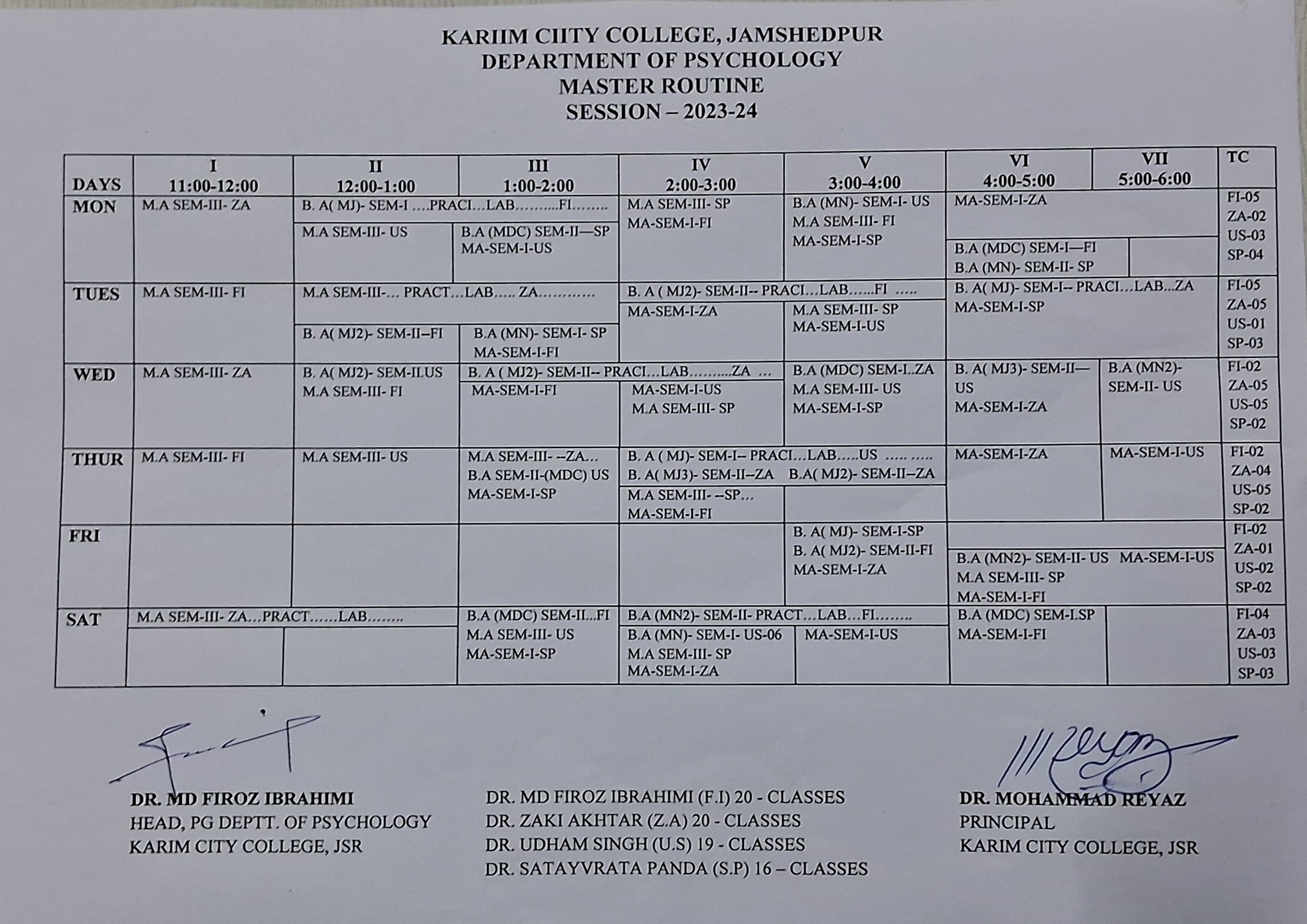
Results of UG Psychology Hons. From 2018 to 2023
Year | Appeared | Passed | 1st class with Dist. | 1st Class | 2nd class | Pass Percentage |
2018 | 30 | 27 | 14 | 13 | 90.00 | |
2019 | 37 | 34 | 23 | 11 | 91.89 | |
2020 | 20 | 18 | 17 | 01 | 90.00 | |
2021 | 23 | 20 | 3 | 15 | 02 | 86.96 |
2022 | 22 | 21 | 1 | 18 | 02 | 95.45 |
2023 | 06 | 06 | 05 | 00 | 90.00 |
Results of PG Psychology from 2018 to 2023
Year | Appeared | Passed | 1st class | 2nd class | Pass Percentage |
2018 | 17 | 17 | 17 | 0 | 100 |
2019 | 21 | 21 | 21 | 0 | 100 |
2020 | 18 | 17 | 17 | 0 | 94.44 |
2021 | 19 | 19 | 19 | 0 | 100 |
2022 | 20 | 20 | 20 | 0 | 100 |
2023 | 07 | 07 | 07 | 0 | 100 |
List of Toppers
Sl.No | Name | Class | Session |
1 | Devika Singh | U.G | 2014-2017 |
2 | Akansha Singh | U.G | 2016-2019 |
3 | Nishat Perween | P.G | 2016-2018 |
4 | Sadaf Farheen | P.G | 2017-2019 |
5 | Akahsha Singh | P.G | 2019-2021 |
6 | Vivek Kumar | P.G | 2020-2022 |
7 | Sana Perween | P.G | 2021-2023 |
DEPARTMENT OF PSYCHOLOGY TOPPERS UG
Devika Singh, U.G Topper – 2014-2017
Akansha Singh, U.G Topper – 2016-2019
DEPARTMENT OF PSYCHOLOGY TOPPERS PG
Nishat Perween, P.G Topper 2016-2018
Sadaf Farheen, P.G Toppr 2017-2019
Akansha Singh, P.G Topper – 2019-2021
Vivek Kumar, P.G Topper – 2020-2022
Sana Perween, P.G Topper – 2021-2023
Upcoming Events
- There are no upcoming events.





